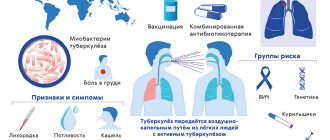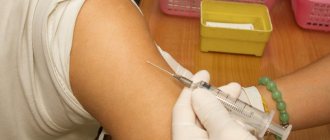In Russia, vaccination against tetanus for children is included in the national vaccination calendar, which indicates great attention to the prevention of this disease throughout the country. The purpose of vaccination is to create resistance to tetanus in the body by introducing antigenic material. Modern medicine considers this one of the most effective ways to prevent disease.
What is tetanus? This is an infectious disease caused by the toxin of the microorganism Clostridium tetani (clostridium tetanus), which is widespread in nature and enters the soil with waste products of herbivores. During their life cycle, Clostridia tetanus releases a powerful neurotoxin that has the ability to affect the central nervous system, causing muscle tension and cramps.
Why is tetanus so dangerous, how does vaccination help prevent the disease, and does a child need a tetanus vaccination? The leading pediatrician at the Medsi children's clinic on Pirogovskaya Madina Abdulaeva .
Why is tetanus dangerous?
Tetanus bacilli can remain in sea and fresh water for up to six months, in soil for up to several years, but it is not the bacteria themselves that are dangerous, but their toxins. When clostridia tetanus enters a wound, especially a deep one, the pathogen multiplies and produces a large amount of toxin. The development of the disease in 80% of cases develops into a generalized form, when there is a focus and subsequent areas covered, which leads to human disability or death. Even small but deep tissue damage is enough for the development of tetanus.
Madina Abdulaeva told how the onset of the disease can occur:
“The first sign of the disease may be convulsive clenching of the jaw muscles. Then the spasms move to the muscles of the face and larynx, and it becomes difficult for the child to swallow. The cramps then spread to the back muscles and other muscles of the body. Spasm of the laryngeal muscles can cause sudden death. The mortality rate for developed tetanus is from 10 to 70%, depending on the age and health of the patient. Timely medical assistance can save the patient’s life.”
Tetanus affects all age groups. In Russia, up to 35 cases of the disease are registered annually. About 70% of cases are unvaccinated people over 65 years of age.
Tetanus is rare only in countries with developed medicine. Where medical services are not widely available to the population, tetanus is a real threat, claiming the lives of not only children, but also adults.
pixabay.com/
What does tetanus look like and why is it dangerous?
The clinical picture of tetanus depends on the course of the disease and its incubation period. The incubation period is the time from the spore entering the body to the first signs of illness. The longer it is, the easier this disease usually progresses.
Thus, mild and moderate course of the disease is characterized by convulsions, spasms, and paralysis throughout the body. Opisthotonus occurs - a condition in which the patient arches, resting only his heels and the back of his head on the bed. Signs of tetanus develop up to 5 days, and the illness lasts up to 12 days.
Severe forms of tetanus are characterized by a short incubation period, very rapid development of symptoms, and convulsions practically do not stop. The bulbar form is especially serious, in which there is a high risk of asphyxia: a person suffocates due to spasms of the muscles of the respiratory tract. In severe cases, the disease can last up to 3 weeks.
Tetanus is a fatal disease; even with its treatment with modern methods, from 17 to 40% of patients die. In countries where preventive vaccinations are not adopted, there is no qualified medical care, the mortality rate reaches 80%. And 95% of sick newborns die.
The disease is accompanied by various complications, and in any form, damage to the central nervous system is irreversible. The positive thing is that a patient with tetanus is not contagious to those around him. At the same time, immunity is not developed after an illness, therefore, having been ill once, you can become infected again.
Does the vaccine have side effects?
Our expert Madina Abdulaeva confirms that the tetanus vaccine can have some unpleasant consequences:
“Side effects can be of a general nature - increased body temperature, malaise, an allergic reaction to the composition of the serum. Local undesirable consequences include swelling, hardening of the tissue around the injection site, redness, and painful reaction. But in general, vaccination is well tolerated. Separately, the tetanus vaccine is given urgently in case of injury, mainly to adult patients.”
pixabay.com/
Contraindications to vaccination
To prevent unpleasant symptoms from appearing after vaccination, it is necessary to choose the right period when this can be done. The following contraindications exist:
- low weight children, prematurity;
- any acute diseases or exacerbation of chronic ones;
- critically low level of immunity after chemotherapy, radiation, immunosuppressive therapy, as well as any forms of immunodeficiency;
- allergy to the vaccine and components;
- severe reaction to a vaccine previously.
Separately, it is worth discussing the possibility of prescribing vaccinations for pregnant women. In most cases, this condition is considered a contraindication to vaccination, but there are a number of features. Pregnant women are not recommended to get any vaccinations. The best thing to do is to worry about vaccination at the planning stage. Then the mother's antibodies will be passed on to the child and will protect him in the first months after birth. But if the pregnancy was unexpected, and there is a bad epidemiological situation with tetanus in the region, the vaccine can be administered in the last weeks of pregnancy so that immunity has time to form.
Where do children get tetanus vaccinations?
Tetanus vaccination for children is given intramuscularly, into the deep layers of the muscles. For vaccination, areas of the body with developed muscles, minimal fat and thin skin are selected. If the drug gets under the skin, unwanted inflammatory processes may begin. A tetanus injection is given to children under three years of age in the front surface of the thigh, and for those older - in the subscapular area. Parents are warned that after vaccination, children should not visit public places where there may be people infected with colds and other diseases, since in the first days after vaccination, immunity is somewhat reduced.
Vaccination schedule
The schedule for tetanus vaccinations depends on whether they are given to a child or an adult. Vaccination involves a cycle of “vaccination + revaccination”. The following terms apply for the child:
- vaccination against tetanus - 3, 4, 5, 6 months (the main limitation is the administration of each subsequent vaccination no earlier than 45 days);
- revaccination - 18 months, 7, 14 years.
Adults vaccinated under this plan as children should receive a booster shot every 10 years. If information about an adult’s vaccination is lost or he has not been vaccinated before, 2 injections are given with an interval of 30 days. A year later, the third stage of vaccination is carried out, after which the course of vaccinations is considered complete. Adults of the following categories are required to be vaccinated: students, military personnel, residents of areas with unfavorable epidemiological conditions, and agricultural workers.
Unfortunately, the tetanus vaccine does not always completely eliminate the possibility of infection, but in any case, the disease will pass without symptoms or with less significant symptoms, and will not lead to death.
In some cases, emergency vaccination against tetanus is required, this can also be done at the NEARMEDIC clinic:
- before a complex operation;
- for burns, severe frostbite, injuries;
- for animal bites;
- for gangrene, ulcers on the skin and mucous membranes, non-healing wounds;
- after home birth.
The decision to administer the vaccine in emergency mode is made by the doctor on an individual basis. If there is reliable evidence that the patient underwent mandatory immunization in childhood according to the schedule, and the last booster vaccination against tetanus was carried out no later than 5 years before the incident, the vaccination may not be given. If a decision is made to vaccinate, vaccination is carried out according to a special scheme with two types of drugs.
As planned, the tetanus vaccine is combined with other components. The most common option is DTP, which additionally contains components for diphtheria and whooping cough. Its analogue without the pertussis component is ADS. European vaccines may also contain a component against polio and hepatitis B.
Can children be vaccinated against tetanus if they are injured?
“Indeed, sometimes there are cases when a child needs vaccination unscheduled. This applies to situations where a child has injured himself: stepped on a rusty nail, cut himself with glass, or driven a wooden splinter deep under the skin. To prevent the penetration of bacterial toxins through wounds on the surface of the skin and reduce the risk of infection, the child is administered anti-tetanus serum immediately after injury,” says Madina Abdulaeva.
The incubation period for tetanus is at least three days; anti-tetanus serum must be administered within a few hours of injury. But there are exceptions if you have been immunized within the last five years. Then these measures are no longer necessary after receiving wounds.
An unvaccinated child is vaccinated as part of complex vaccines (DPT, Infanrix, Infanrix Hexa, Adasel, ADSM). The choice of vaccines depends on the child's initial health status and the availability of vaccines. In any case, parents need to ensure that the vaccination schedule is not disrupted.
pixabay.com/
Indications and contraindications
The main indication is the need to eliminate an infectious lesion, and serum is prescribed only in very emergency cases. Anti-tetanus serum can be used as a prophylaxis, for further safety and to prevent tetanus infection.
The main reasons for which serum needs to be administered urgently include:
- bites of previously unvaccinated animals;
- severe and penetrating injuries to the skin;
- damage to the digestive system;
- skin lesions, their complications - gangrene, abscess, necrosis;
- frostbite;
- abortion or childbirth that took place in unsanitary conditions;
- burns;
- traumatization of mucous membranes.
However, not in all cases, if there is a reason listed above, there is a need to administer anti-tetanus serum. This is not necessary if the person has documented proof of routine tetanus vaccination, and if the person has completed a full course of immunization no more than five years ago.
There are also contraindications to the administration of antitoxin, including:
- elevated temperatures at the time of serum administration and hospitalization;
- the presence of allergies to any components, which may cause intolerance to the drug;
- first trimester of pregnancy.
In any case, in the event of any injury that may lead to infection with tetanus, consultation with a specialist is necessary, which should be urgently done in order to avoid serious complications.
Reaction to vaccination
Typically, a child's body reacts more strongly to a tetanus vaccine than an adult. In addition to pain and swelling at the injection site, children’s bodies may react to vaccination with the following reactions:
- drowsiness or excessive activity;
- temporary refusal to eat;
- headache, tearfulness.
It is normal for a baby to have a fever. Therefore, children are advised to take antipyretic drugs in pediatric dosages. For allergic rashes, give antihistamines approved by your doctor. Swelling and hardening at the injection site can be relieved using an iodine mesh.
After a few days, the side effects will disappear, and the baby will remain protected from life-threatening infections. Moreover, the symptoms of tetanus are similar to the signs of other, no less dangerous diseases.
Diphtheria vaccine
The guarantee of protection from vaccination is not 100%, but has a high degree of reliability - medical statistics report that only 10% of people who received a diphtheria injection did not avoid infection, but suffered from the disease more easily than those who refused vaccination. Vaccination is the introduction of a weakened diphtheria toxin, which does not provoke the development of the disease, but forces the body to synthesize antitoxins. The vaccine does not act on the caught diphtheria bacillus - only on the substances it secretes. There are 2 groups of compositions on the basis of which vaccination is performed:
- With the preservative thiomersal - a compound containing mercury, considered teratogenic, mutagenic and carcinogenic, causing allergies. Russian vaccines DTP, ADS-M and ADS (often vaccinations against tetanus and diphtheria for children are given on their basis) contain thiomersal in an amount of 100 mcg/ml. Otherwise, experts refer to it as merthiolate.
- Without the preservative thiomersal - they are produced in syringes with a single dose, since they cannot be stored for a long time. However, such compositions are safer. The most famous vaccine option for vaccination without thiomersal is Pentaxim.
The most common vaccine option for vaccination against diphtheria is DTP - adsorbed pertussis-diphtheria-tetanus, which contains purified microbes that cause all 3 diseases. They are sorbed using aluminum hydroxide gel. For 1 ml (1 vaccination – 0.5 ml) of vaccine there is:
- pertussis microbe cells – 20 billion;
- diphtheria toxoid – 30 units;
- tetanus toxoid – 10 units.
The preservative for this vaccine for diphtheria vaccination is the mentioned thiomersal, but technically ADKS fully complies with the requirements of the World Health Organization. However, in terms of the number of post-vaccination complications, this composition is not the safest. The DPT vaccine is produced by the Russian vaccine, which produces two of its varieties:
- DPT - diphtheria-tetanus toxoid is given mainly to children (under 6 years of age), it is a replacement for DPT if the child has contraindications to the latter. According to the principle of action, this vaccine is similar to other complex ones against diphtheria.
- ADS-M toxoid - differs from the previous version of the composition for vaccination in a reduced proportion of diphtheria toxoid, therefore it is prescribed to children aged 6 years and older, and adults are given injections at intervals of 10 years.
Vaccination against diphtheria can also be carried out using a foreign composition - also complex, therefore aimed at protecting against several diseases at once. In terms of the set of active components, these vaccines are close to the Russian ADKS, but they are devoid of thiomersal, due to which they are considered safer, especially for children. In modern medicine, the following are used for vaccinations to prevent diphtheria:
- Pentaxim - produced by Aventis, works not only against tetanus, whooping cough and diphtheria, but also against polio (viruses 1-3 types) and Haemophilus influenzae infection. The composition contains formaldehyde and phenoxyethanol. It is given to children over 2 months old.
- Infanrix - produced by Glaxo, contains 30 units of diphtheria toxoid, 40 units of tetanus and 25 mcg of pertussis, which is superior to the Russian ADKS. Additionally, hemagglutinin and pertactin antigens are present here. Full protection of the body is observed after a course of 3 vaccinations. The composition is approved for children from 2 months.
- Infanrix Hexa - this version of the foreign vaccine is already used not only against the main three childhood diseases, but can also protect against polio, Haemophilus influenzae infection and hepatitis B. It also has a truncated version that does not affect hepatitis and Haemophilus influenzae infection - Infanrix IPV.









